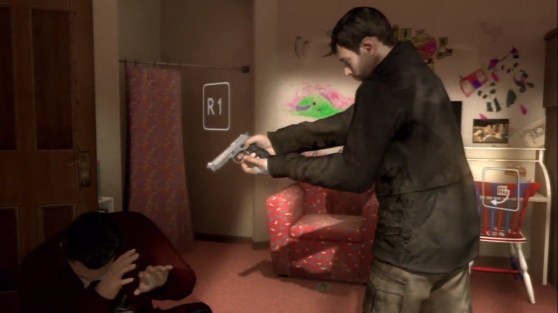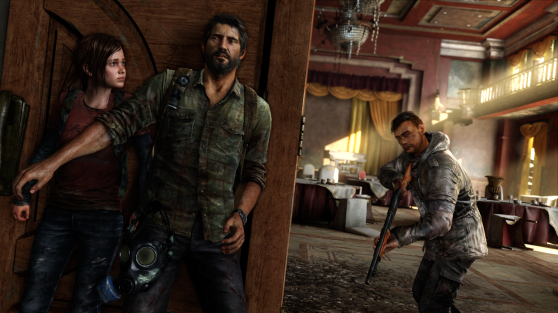This post has not been edited by the GamesBeat staff. Opinions by GamesBeat community writers do not necessarily reflect those of the staff.
When video game violence makes headlines, it’s usually at the expense of geekdom. Such was the case with Vice President Joe Biden’s recent comments that he sees no legal barrier to prevent a tax on violent games. But in an interview with GamesIndustry.biz, former Grand Theft Auto and Max Payne producer Jeremy Pope recently brought up one word that has everything to do with why video games need violence if they want to ever be considered a more culturally valuable form of expression. That word is conflict — more specifically, meaningful conflict that propels a story forward.
“I do agree that we need to be pushing ourselves [as an industry],” Pope said. “With any storytelling medium or any medium at all, you want to have conflict because that’s how you can generate interest, and oftentimes the simplest or most base way to do that is through violence that isn’t necessarily tied in to a deeper, more meaningful story.”
The implication that violence in most games is relatively meaningless is absolutely correct. But if anyone wants a bulletproof defense against arguments that video game violence has no potential value, Pope served it up on a platter. Games tell stories, and great stories need conflict. Look at any other storytelling medium, and it’s obvious that violence can be used amidst meaningful conflict to help tell a worthwhile tale. In some cases, the use of violence can even help validate why those mediums exist in the first place. Quentin Tarantino’s movies do this for film. Eminem’s lyrics did it for rap music. Anthony Burgess’s novel The Clockwork Orange helped do it for modern literature. If games are to ever mature — and I mean really, really mature — then a brilliant storyteller must do it for games.
What sets those brilliant works apart from games like Grand Theft Auto, Call of Duty, and nearly all other violent games is this: In those games, violence is the point of interest. In The Clockwork Orange, Tarantino’s film Django Unchained, or Eminem’s breakout hit “Stan,” violence is a necessary side effect of a culturally relevant conflict.
It’s no secret that some of today’s sharpest industry minds are on to this — such as David Cage, the head developer at Quantic Dream, which produced Heavy Rain and the upcoming Beyond: Two Souls. Speaking at the Tribecca Film Festival, Cage articulated what separates meaningful violence from senseless brutality.
“I’m fine with violence as long as it comes with a meaning,” he said. “If it means something, if it allows you to tell something about the character or to create a specific emotional state, I’m fine with that. When you look at films, there are some incredible films from talented filmmakers that are incredibly violent. It’s not gratuitous, not just for the sake of being violent. It serves the story, it serves the characterization. I’m against violence when it’s free, when it’s gratuitous and there is no reason for it; when it’s just about showing blood or showing sex.”
For an example of how meaningful violence can exist within a video game, consider the scene in Cage’s own Heavy Rain, in which the player must choose between shooting a drug dealer in the head or letting the protagonist’s innocent 10-year-old son die. Which action is the right one? Can one life be more valuable than another? Is murder ever justifiable? These are powerful questions that lead the player toward introspection and were brought into consideration through the use of brutal, in-game violence.
Contrast that effect with the multiplayer mayhem of today’s first-person shooters, where the challenge is not to overcome some moral dilemma but to kill other virtual humans as efficiently as possible. Yes, these games have a story, but it’s the multiplayer matches that have been called out as a training ground for potential terrorists. It’s not unreasonable to conclude that if developers want to invite criticism and discussion of taxing violent games, they should keep doing what they’re doing until they release Call of Duty: Black Ops 12 (mark your calendars).
That’s not to say that violence as a form of borrowed interest doesn’t have its place in games. At the very least, controlling a roid-raging marine who makes entire populations of alien scum explode at the pull of a trigger is a boatload of fun. But instead of defending the games that already exist, perhaps developers, publishers, and gamers alike should spend more energy on creating a demand for ones that portray violence within a more meaningful context. This would not only go a long way in establishing a reasonable defense for why violence belongs in interactive entertainment but also help video games finally grow the f**k up.
Cynics in the game industry might say that the demand for such games doesn’t exist — that the appetite for emotionally or intellectually deep content is too small and that games like Heavy Rain are just an anomaly. Those people should look at the sales numbers for The Last of Us.
Here’s a game that tells a far-fetched sci-fi story, yet the writing is so good and the performances so believable that players are all but forced to suspend their disbelief within the first 15 minutes. Once the game establishes that the characters are human beings with feelings and a will to live, they are then brutalized and tormented with zero sympathy. But that’s OK. In fact, it’s necessary because without scenes where the characters are beaten and even killed, The Last of Us would lose its realism. The violence believably and accurately portrays how horrible the human condition can become, and a more reflective depiction of humanity than that would be hard to come by.
If video games are to graduate into the same league as films and literature, then games like The Last of Us and Heavy Rain are an absolutely necessity. Violence is a powerful visual stimulus that can help people see and even realize things that they had never previously considered. It can induce sympathy, empathy, and anger. It can make people question authority and ponder morality. Violence, for better or worse, is human, and to limit its presence in video games would not only restrict developers’ freedom to express themselves but also strip them of their ability to portray and expand on the human experience.
Josh is a freelance writer and a branding copywriter for a mobile-gaming company. You can find him exploring the streets of San Francisco, or you can follow him on Twitter @jayfin9.




